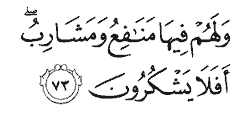Ingratitude, Oppression, Why Pray?
Issue 619 » February 4, 2011 - Safar 30, 1432
Living The Quran
Ingratitude
Ya-sin (Ya-sin) - Chapter 36: Verse 73
 "They derive a variety of benefits and drinks from them (cattles). Will they, then not give thanks?"
"They derive a variety of benefits and drinks from them (cattles). Will they, then not give thanks?"
Ingratitude consists in crediting someone other than the True Benefactor as the source of the bounty that one has received, or giving thanks for it to anyone other than Him, or expecting or seeking it from anyone other than Him. In like manner, using God's bounty in ways that do not please Him also amounts to ingratitude. Therefore, a polytheist, unbeliever, hypocrite or transgressor cannot be regarded as God's grateful servant merely because he verbally thanks God.
The Makkan unbelievers did not deny that God had created their cattle. They also did not content that any of their idols had a role in creating them. Yet they thanked their gods for the bounties conferred upon them by God, offering them sacrifices and invoking them for the bestowal of further bounties. This, therefore, make their verbal expression of gratitude to God meaningless. They were, therefore, branded as ungrateful.
Compiled From:
"Towards Understanding the Quran" - Sayyid Abul Ala Mawdudi, Vol. 9, p. 273
Understanding The Prophet's Life
Oppression
"There are three types of dhulm: a type of dhulm that Allah does not leave, a type of dhulm that can be forgiven and a type of dhulm that is not forgiven. The dhulm that is not forgiven is shirk that Allah does not forgive. The dhulm that is forgiven is what is between a person and his Lord. And the dhulm that is not left is the dhulm between the servants [humans]. Allah gives them retribution from one another." [Ahmad]
Everything that Allah has forbidden is, in one way or another, a type of dhulm (oppression), while everything that He has ordered is a form of adl or justice. The greatest injustice is shirk (associating partners with Allah). The Prophet, peace be upon him, was once asked what is the greatest sin. He answered: "It is that you associate a partner with Allah while He created you." [Bukhari, Muslim]
Some of the common forms of dhulm that people commit towards one another are cheating in business transactions, denying one's debt to another, backbiting, killing one another, denying the rights of another and so forth. The one who commits dhulm to others must be especially fearful when he realizes that the supplication of the one he is wronging will be responded by Allah, even if that wronged person were an unbeliever. The Prophet Muhammad, peace be upon him, said: "Protect yourself from the supplication of the one who is wronged, even if he be a disbeliever, for there is no barrier for it [between he/she and Allah]." [Ahmad]
Compiled From:
"Commentary on the Forty Hadith of al-Nawawi" - Jamaal al-Din M. Zarabozo, pp. 918-931
Blindspot!
Why Pray?
The benefits of daily prayers are twofold. The first benefit that daily prayer provides is a constant reminder throughout the day that we are God's servants. Each prayer is performed at a different strategic time so that no matter what we are doing or how busy we get, we are always aware that we either prayed a few hours ago or will pray again soon. This keeps the mind fresh and aware of our duty to God, and we become much less likely to want to break one of His laws. Who wants to cheat on a business contract when an hour later you are going to stand before God and ask for His favour and guidance? Only a hypocrite would be so brash (and God doesn't count their prayers on account of their duplicity).
The second benefit is that God forgives some of our sins each time we perform salat (prayer). If we are negligent in our duty and pray only irregularly, then we run a very great risk on Judgment Day.
Many concerned people get the impression that Islam is hard to follow. It's not as onerous as it sounds. A Muslim becomes used to the routine, and once you're used to something it doesn't become difficult any longer. The idea is that if you truly understand that God is real, you won't hesitate to take every opportunity to pray to Him.
Compiled From:
"The Complete Idiot's Guide to Understanding Islam, 2nd Edition" - Yahiya Emerick, pp. 136-137